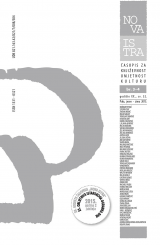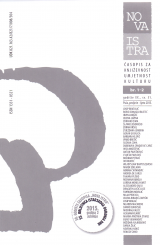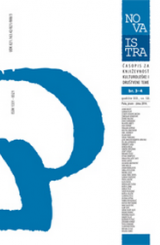Car Matutinović Ljerka
LJERKA CAR MATUTINOVIĆ, contemporary Croatian poetess, prose-writer, children's author, essay-writer and translator, born in Crikvenica. Graduated Croatian and Italian from the Faculty of Philosophy, the University of Zagreb. Member of the Croatian Writers’ Association since 1975, the Croatian PEN Centre, the Zagreb Centre of the European Cultural Society (based in Venice), and the Croatian Writers' Society (2005).
Her literary reviews, interpretations and essays have been published since 1961. Her poems (since 1965) and stories (since 1975) have been released in many journals and newspapers (Kolo, Republika, Riječka revija, Dometi, Istra, Forum, Dubrovnik, Mogućnosti, Most, La Battana, Impegno 80, Oko, Vjesnik, Večernji list, Hrvatska revija, Vijenac, Hrvatsko slovo, Nova Istra, Književna Rijeka, Kaj).
Her poems have been translated in some ten foreign languages, and her stories into Italian and German. Included in Croatian and foreign anthologies, as well. Lives and works in Zagreb.
Fourteen books of her poetry have been also published, the two of them being in the chakavian dialect: 'Kanat slaji od meda' and 'Čakavske versade', as well as the Litrati cycle in the collection titled 'Jabuka na glavi' (2001).
Books to be particularly mentioned: 'Vrijeme rastanaka' (1971), 'Odiljat se' (1983), 'La Bellezza del respiro – Ljepota disanja' (1984, winning the Mazara del Vallo Golden Medal, 1985), 'Glasovi glazba' (1988), 'Bezumlje' (1994), 'Disanje', selection (1997), 'Jabuka na glavi' (2001), 'Versi o nepotrošivoj ljubavi' (2005).
Children's books worth mentioning: 'MA i LU' (novel, two editions in 5000 copies,1989 & 1990), 'Tri pustolova hrabra' (1996), 'Sve niče iz priče' (2000), 'Raduj se danu' (poems, 2004).
Fiction for adults: 'Ljubavni jadi Ružice Trnoružice' (1986), 'Seoba mora' (1996), 'Opsjenar Galateo, srednjovjekovne priče' (2003), 'Mirakul zvan ljubav' (2006).
Literary-critical prose: 'Pjesnička riječ Dragutina Tadijanovića' (1970), ‘Čin riječi' (1979), 'Odjeci pjesničke riječi' (1991), 'Hrvatski pjesnici, Školska antologija' (2006).
Translations from Italian: Alberto Moravia: Nosorog (1991), Gianni Rodari: Putovanje plave strijele (1995), Carlo Collodi: Pinokio (1996), Gianni Rodari: Čipolino (1998), Boccaccio: Dekameron (2002), Ususret renesansi (Dante, Petrarca, Boccaccio) (2003), Žena od kamena, izbor iz suvremene talijanske proze, (2005).
Poetry and prose writings by Lj. C. Matutinović have won many prizes, such as: Drago Gervais Prize (for poems), Rijeka (1981&1985); Il Borghetto Prize, Citta’ di Montepulciano (1988 &1989); 1st Prize for Prose and Poetry, San Bartolo; Special prize for poetry, Florence (1996); Life Achievement Award by the City of Crikvenica (1996); and recently: the Prize at the International Competition for Poetry and Prose, Citta’ di Salo’, for the poem 'Sonet o povratku molitvi' (2005).
Summary
In these essayistic and poetic considerations, I tried to answer to some crucial questions about the counterpoint between the imagination of love and the depressive relations of hate. There is a sense of love born in the conscious being, it is essentially the purpose of all thoughts and feelings. The being yearns for the realisation of love and strong desire but, to be able to achieve this, it has to intrude itself with the power of its mental and physical existence. The being must not passively give itself up to a plenty of emotions, with its creative imagination it will accept the idea of being able to ‘have mastery of love’. As loving means living for ever.
These imaginative activities are connected with the processes of artistic performance, so verses are to be seen as the quintessence of love emotions. Yet, such a feeling may be a trick, for love, in the triumph of realisation, gives a sense of being ‘almighty’. And this is precisely the relation where a trap is hidden, a feeling of anxiety and insecurity appears: love is entering the field of ‘mystifications’. The enigma which is so dear to us hides its real identity and the clash between two beings is unavoidable. The alienated ‘galactic systems’ of two beings move in the domain of hate which includes all the mechanisms of differences. Instead of being obsessed by love, we are becoming obsessed by hate that is a complex emotion and also efficient as it has been already proved. There is one thing common to these two powerful emotions: Both of them bring pain and suffering. Disappointment is unavoidable: beings are becoming aware of the fact that ‘they cannot have everything and nothing lasts for ever’!
Then, literature appears as a certain ‘love substitute’. Literature ‘saves’ love from disaster and destruction. It gives dignity and power back to love but, at the same time, it is quite aware of all antagonisms and ‘illusions of happiness’. The saturation of hate and love means life with all its unpredictable changes. From which we cannot escape!
Translated by: Renata Šamo





Nova Istra broj 3-4/2015.
- U sjećanje
- Suvremena književnost
- Tema: HRVATSKA KNJIŽEVNOST U SUSJEDSTVU
- Nagrada „Zvane Črnja“ za 2014.
- Novi prijevodi
- Studije, ogledi, zapisci
- U spomen: GORAN STARČEVIĆ
- Hrvati i Ukrajinci
- Prilozi o zavičaju
- Kritički pristupi i osvrti

Nova Istra broj 1-2/2015.
- U sjećanje
- Suvremena književnost
- Tema: ANTUN GUSTAV MATOŠ (1873.-1914.)
- Novi prijevodi
- Studije, ogledi, zapisci
- Prilozi o zavičaju
- Kritički pristupi i osvrti

Nova Istra broj 3-4/2014.
- Suvremena književnost
- Novi prijevodi
- Tema: Optimizam
- Nagrada "Zvane Črnja" za 2013.
- Ogledi i zapisci
- Tema: Politika i političari
- Prilozi o zavičaju
- Kritički pristupi i osvrti


